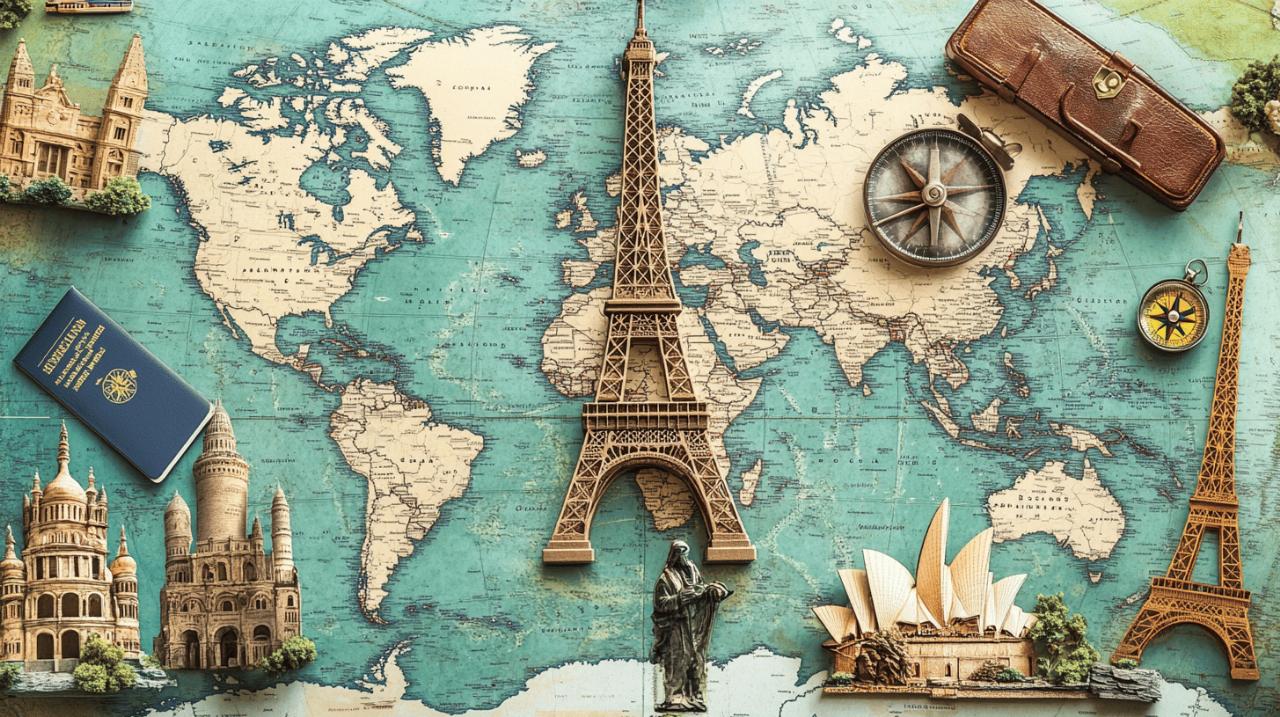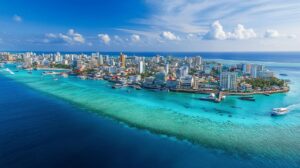Embarking on a round-the-world adventure represents the pinnacle of travel aspirations for countless wanderlust-filled souls. The prospect of traversing continents, immersing oneself in diverse cultures, and witnessing the planet's myriad wonders is undeniably thrilling. However, the success of such an ambitious undertaking hinges not merely on enthusiasm but on meticulous preparation and a keen awareness of the practicalities that ensure both safety and wellbeing throughout the journey. Transforming dreams into reality requires a thoughtful approach to planning, encompassing everything from essential documentation to health safeguards, financial management to cultural sensitivity. This comprehensive guide aims to equip you with the knowledge and strategies necessary to navigate the complexities of extended global travel, ensuring that your world tour remains a source of joy and discovery rather than stress and difficulty.
Planning your round-the-world adventure: essential preparations before departure
The foundation of any successful global expedition lies in thorough preparation well before departure. Rushing through these initial stages can lead to unforeseen complications that might derail your plans or compromise your safety. Allocating sufficient time to address the critical elements of travel documentation, insurance, and health precautions is paramount. The Centers for Disease Control and Prevention recommends consulting a healthcare professional at least one month prior to departure, allowing adequate time for necessary vaccinations to take effect and for tailored medical advice specific to your intended destinations. This proactive approach ensures that you are not only protected against preventable diseases but also equipped with the knowledge to manage health risks specific to the regions you will be visiting. Beyond health considerations, the logistical aspects of securing proper documentation and comprehensive insurance coverage form the bedrock of a worry-free journey, providing peace of mind as you venture into unfamiliar territories across the globe.
Securing travel documentation and comprehensive insurance coverage
Ensuring that all travel documentation is in order stands as the first and most crucial step in your pre-departure preparations. Your passport must be valid for at least six months beyond your planned return date, as many countries enforce this requirement strictly. It is prudent to make multiple copies of your passport, visa pages, and other critical documents, keeping one set with a trusted contact at home and another in a separate location within your luggage. Enrolling in the Smart Traveler Enrollment Program allows your home country's embassy to contact you in case of emergency and provides an additional layer of security during your travels. Equally important is securing comprehensive travel insurance that covers medical emergencies, evacuation, trip cancellations, and lost belongings. Standard health insurance policies often provide limited or no coverage abroad, making specialised travel insurance an essential investment. Services such as Global Rescue offer memberships that include not only medical assistance but also emergency evacuation and telehealth consultations, ensuring that help is accessible regardless of your location. Recording emergency contact numbers, including local embassy details and insurance helplines, and keeping them readily accessible throughout your journey is a simple yet vital precaution. Additionally, setting up credit card alerts can help you monitor transactions and quickly address any unauthorised activity, safeguarding your finances whilst abroad.
Health precautions: vaccinations and medical kit essentials
Protecting your health during extended travel requires more than just good intentions; it demands specific preventive measures tailored to the destinations on your itinerary. Routine immunisations such as the MMR vaccine should be up to date, and additional vaccinations may be required depending on the regions you plan to visit, particularly in developing countries where certain diseases remain prevalent. Consulting with a travel health specialist ensures that you receive personalised recommendations based on your medical history and travel plans. Assembling a comprehensive travel health kit is equally important and should include prescription medications in their original containers, over-the-counter pain relief, anti-diarrheal medication, antihistamines, and any specific treatments you might require. Insect repellent containing an effective concentration of active ingredients is crucial for preventing bites that can transmit serious illnesses, whilst sunscreen with a sun protection factor of fifteen or higher guards against harmful ultraviolet exposure. Hand sanitiser with at least sixty percent alcohol content provides a convenient means of maintaining hand hygiene when soap and water are unavailable, significantly reducing the risk of gastrointestinal infections. A basic first aid kit containing adhesive bandages, antiseptic wipes, and blister treatment should also be included. Staying hydrated, particularly in hot climates, and being mindful of food and water safety are fundamental practices that help prevent illness. Choosing foods that are hot, dry, packaged, or thoroughly cooked reduces the likelihood of contamination, whilst avoiding tap water in areas where its safety is questionable protects against waterborne diseases. Should you feel unwell during your travels, especially if accompanied by fever, seeking medical attention promptly and informing healthcare providers of your recent travel history enables appropriate diagnosis and treatment.
Crafting a Flexible Itinerary: Balancing Must-See Destinations with Spontaneous Discoveries
Whilst the allure of a meticulously planned itinerary is undeniable, the magic of world travel often lies in the unexpected moments and spontaneous detours that arise along the way. Striking a balance between structure and flexibility allows you to experience both the iconic landmarks you have long dreamed of visiting and the hidden gems that reveal themselves through serendipitous encounters. An overly rigid schedule can lead to stress and disappointment if delays or unforeseen circumstances arise, whereas an entirely unplanned approach may result in missed opportunities and logistical challenges. The key is to establish a framework that outlines your primary destinations and approximate timeframes whilst leaving ample room for adjustments and unplanned adventures. Researching your chosen locations thoroughly before departure provides valuable insights into local customs, seasonal weather patterns, and must-see attractions, enabling you to make informed decisions about where to linger and where to move on more quickly. Sharing your itinerary with a trusted contact at home not only enhances your safety by ensuring someone knows your whereabouts but also provides a useful reference point should you need assistance during your travels. Embracing the philosophy that the journey is as important as the destination enriches your experience and allows you to fully immerse yourself in the diverse cultures and landscapes you encounter.
Prioritising your bucket list locations whilst allowing room for serendipity
Every traveller embarks on a world tour with a personal bucket list of destinations that hold particular significance, whether due to natural beauty, cultural heritage, or personal interest. Identifying these priority locations early in your planning process ensures that you allocate sufficient time to explore them thoroughly and that logistical arrangements such as visa applications or advance bookings are completed well ahead of your arrival. However, it is equally important to resist the temptation to overpack your schedule with an exhausting succession of must-see sites, as this can lead to travel fatigue and diminish your overall enjoyment. Instead, intersperse your major destinations with periods of relative relaxation or exploration in lesser-known areas that may not feature prominently in guidebooks but offer authentic experiences and opportunities for meaningful interactions with local communities. Joining group tours in certain locations can provide both safety and social connection, particularly for solo travellers, whilst also offering expert insights into historical and cultural contexts that might otherwise be missed. Trusting your instincts about where to go and when to stay longer is a valuable skill that develops with experience; if a particular place resonates with you, extending your visit can lead to deeper connections and more memorable experiences. Conversely, if a destination fails to meet your expectations, giving yourself permission to move on without guilt allows you to make the most of your finite travel time. Maintaining a flexible mindset and viewing your itinerary as a living document that evolves based on your experiences and preferences transforms your world tour from a checklist of sights into a genuine journey of discovery.
Seasonal considerations and climate planning across multiple continents
Navigating the climatic diversity of multiple continents requires careful consideration of seasonal variations and their impact on both comfort and accessibility. Monsoon rains in Southeast Asia, scorching summer heat in the Middle East, and frigid winter temperatures in northern regions can all significantly affect your travel experience and necessitate adjustments to your itinerary and packing list. Researching the optimal visiting seasons for each destination enables you to maximise favourable weather conditions and avoid periods when natural disasters such as hurricanes or floods are more likely. However, travelling during shoulder seasons can offer distinct advantages, including fewer crowds, lower accommodation costs, and a more relaxed atmosphere, provided you are prepared for less predictable weather. Packing versatile clothing layers that can be adapted to varying temperatures and conditions is essential, as is ensuring that your luggage includes appropriate protection against sun, rain, and cold. Sunscreen application should become a daily habit regardless of apparent weather conditions, as ultraviolet exposure remains a risk even on overcast days. Similarly, staying vigilant about hydration and adjusting your activity levels in extreme heat or high altitudes helps prevent heat-related illnesses and altitude sickness. Being aware of local climatic patterns and planning your daily activities accordingly, such as exploring cities during cooler morning hours or seeking indoor attractions during midday heat, enhances both comfort and safety. Ultimately, respecting the natural environment and adapting your plans to work with rather than against prevailing conditions ensures a more enjoyable and sustainable travel experience.
Staying safe whilst exploring: practical security measures for global travellers
 Safety concerns represent one of the most common anxieties for travellers embarking on extended journeys, particularly when venturing into unfamiliar territories or developing countries. Whilst it is important to remain vigilant and take sensible precautions, it is equally crucial not to allow fear to overshadow the excitement and enrichment that global travel offers. The vast majority of travellers navigate their journeys without encountering serious security issues, and adopting a proactive approach to safety significantly reduces the likelihood of problems. Situational awareness forms the cornerstone of personal security; staying alert to your surroundings, trusting your instincts, and avoiding situations or locations that feel uncomfortable or unsafe are fundamental practices that serve you well regardless of where you are. Researching each destination before arrival provides valuable insights into local safety concerns, common scams, and areas to avoid, enabling you to make informed decisions about your movements and activities. Checking travel advisories issued by your government offers up-to-date information about political stability, health risks, and security threats in specific regions, allowing you to adjust your plans if necessary. Whilst no amount of preparation can eliminate all risks, combining common sense with practical security measures creates a robust framework that protects both your person and your possessions throughout your travels.
Safety concerns represent one of the most common anxieties for travellers embarking on extended journeys, particularly when venturing into unfamiliar territories or developing countries. Whilst it is important to remain vigilant and take sensible precautions, it is equally crucial not to allow fear to overshadow the excitement and enrichment that global travel offers. The vast majority of travellers navigate their journeys without encountering serious security issues, and adopting a proactive approach to safety significantly reduces the likelihood of problems. Situational awareness forms the cornerstone of personal security; staying alert to your surroundings, trusting your instincts, and avoiding situations or locations that feel uncomfortable or unsafe are fundamental practices that serve you well regardless of where you are. Researching each destination before arrival provides valuable insights into local safety concerns, common scams, and areas to avoid, enabling you to make informed decisions about your movements and activities. Checking travel advisories issued by your government offers up-to-date information about political stability, health risks, and security threats in specific regions, allowing you to adjust your plans if necessary. Whilst no amount of preparation can eliminate all risks, combining common sense with practical security measures creates a robust framework that protects both your person and your possessions throughout your travels.
Managing Your Finances and Valuables in Unfamiliar Territories
Protecting your financial resources and valuable belongings requires a multi-layered approach that combines physical security measures with smart financial practices. Carrying large amounts of cash increases your vulnerability to theft and loss, yet relying exclusively on credit or debit cards can prove problematic in areas where electronic payment infrastructure is limited or unreliable. Striking a balance by carrying a modest amount of local currency for daily expenses whilst keeping the majority of your funds accessible through secure banking methods provides both flexibility and security. Using money belts worn beneath clothing or RFID-blocking wallets that prevent electronic pickpocketing of card information adds an extra layer of protection for items you must carry on your person. Anti-theft backpacks featuring lockable zippers and slash-resistant materials offer reassurance when navigating crowded tourist areas or public transport, where pickpockets are known to operate. Storing passports, excess cash, and other valuables in hotel safes when they are not needed reduces the risk of loss should your primary luggage be compromised. Keeping backup funds in a separate location from your main wallet ensures that you retain access to money even if theft occurs, whilst making copies of important documents and storing them both physically and digitally provides insurance against the loss of originals. Avoiding the display of expensive jewellery, watches, or electronic devices that might attract unwanted attention is a simple yet effective deterrent to opportunistic theft. Being particularly cautious in restaurants and cafes, where bags can easily be snatched or forgotten, by keeping purses and belongings in sight and preferably secured to your person, prevents many common incidents. Walking with confidence and purpose, even when uncertain of your direction, projects an image that is less likely to attract predators who typically target individuals appearing lost or distracted. Establishing credit card alerts that notify you of transactions allows immediate detection of unauthorised use, enabling swift action to freeze accounts and minimise financial loss.
Navigating local customs and avoiding common tourist scams
Cultural sensitivity and awareness of local customs not only enhance your travel experience by fostering positive interactions with residents but also contribute significantly to your personal safety. Respecting cultural norms regarding dress, behaviour, and social interaction demonstrates consideration for your hosts and reduces the likelihood of unwittingly causing offence or attracting negative attention. Learning basic phrases in the local language, such as greetings and expressions of gratitude, opens doors to warmer receptions and more authentic experiences, whilst translation apps provide valuable assistance when more complex communication is required. Being patient and maintaining a sense of humour when language barriers create misunderstandings helps diffuse potential frustrations and keeps interactions positive. Unfortunately, tourist areas in many destinations harbour individuals who seek to exploit visitors through various scams and deceptive practices. Common schemes include overcharging for goods or services, fake tour operators, distraction techniques used whilst an accomplice steals belongings, and unsolicited offers of help that come with unexpected costs. Familiarising yourself with the specific scams prevalent in each destination empowers you to recognise warning signs and decline dubious offers politely but firmly. Using licensed taxis or reputable ride-sharing applications rather than accepting lifts from unlicensed operators reduces the risk of overcharging or more serious safety concerns. When hiring guides or booking tours, conducting research beforehand and choosing established operators with verified reviews provides assurance of legitimacy and professionalism. Being cautious when strangers initiate conversations, particularly in tourist-heavy areas, and declining invitations to visit homes or unfamiliar locations with people you have just met protects against situations that could become dangerous. Trusting your instincts and walking away from interactions that feel uncomfortable or overly insistent is always preferable to continuing out of politeness. Maintaining awareness in crowded places, particularly markets, public transport, and festivals, where thieves thrive on distraction and close quarters, helps safeguard your belongings. Ultimately, combining respect for local culture with a healthy degree of scepticism towards too-good-to-be-true offers creates a balanced approach that keeps you both safe and open to genuine connections with the communities you visit.
Maintaining Your Wellbeing Throughout Extended Travel: Health and Nutrition on the Road
The physical and mental demands of long-term travel can take a toll on even the most seasoned adventurers, making attention to health and wellbeing essential for sustaining energy and enjoyment throughout your journey. The excitement of new experiences and the desire to maximise every moment can lead to pushing yourself too hard, resulting in exhaustion that diminishes your capacity to appreciate your surroundings. Recognising the signs of travel fatigue and giving yourself permission to rest and recharge is not an admission of weakness but rather a necessary strategy for long-term sustainability. Similarly, maintaining nutritional balance whilst navigating unfamiliar cuisines and varying food safety standards requires conscious effort and practical knowledge. The temptation to indulge continuously in local delicacies or rely on convenient but nutritionally poor options can lead to digestive issues and depleted energy levels. Establishing routines that prioritise basic health practices, even amidst the unpredictability of travel, provides a stable foundation that supports your ability to make the most of your world tour.
Combating travel fatigue and jet lag across time zones
Traversing multiple time zones inevitably disrupts your body's natural circadian rhythms, leading to jet lag that manifests through symptoms such as fatigue, difficulty concentrating, digestive problems, and disrupted sleep patterns. Whilst complete avoidance of these effects is unrealistic, several strategies can minimise their severity and accelerate adjustment to new time zones. Gradually shifting your sleep schedule in the days leading up to a major time zone change helps your body begin adapting before departure. Upon arrival, resisting the urge to nap immediately and instead exposing yourself to natural daylight encourages your internal clock to reset more quickly to the local schedule. Staying hydrated throughout your journey, particularly during flights where cabin air is notably dry, supports overall wellbeing and reduces some of the physical stress associated with long-distance travel. Avoiding excessive alcohol and caffeine, both of which can interfere with sleep quality and contribute to dehydration, further aids adjustment. Once you have acclimatised to a new time zone, be mindful of the cumulative effects of constant movement and stimulation that characterise world travel. Scheduling rest days into your itinerary, during which you engage in low-key activities or simply relax at your accommodation, provides essential recovery time that prevents burnout. Recognising that travel fatigue is not solely physical but also mental and emotional acknowledges the energy expended in constantly navigating new environments, languages, and social norms. Maintaining contact with loved ones at home through messaging or video calls offers emotional support and a sense of connection that can be grounding amidst the transience of travel. Similarly, establishing small routines such as morning exercise, journaling, or meditation creates islands of familiarity that provide psychological comfort. Listening to your body and adjusting your pace when you feel overwhelmed or unwell demonstrates self-awareness and maturity as a traveller, ultimately enhancing rather than detracting from your overall experience.
Eating safely abroad: food hygiene and dietary balance during long-term travel
Culinary exploration represents one of the great joys of international travel, offering insights into local culture and traditions that few other experiences can match. However, the excitement of sampling unfamiliar dishes must be balanced with awareness of food safety practices that protect against illness. In regions where sanitation standards may differ from what you are accustomed to, exercising caution about what and where you eat significantly reduces the risk of gastrointestinal distress that can derail your plans. Foods that are served hot and freshly prepared generally present lower risk than items that have been sitting at room temperature, whilst thoroughly cooked dishes are safer than those that are raw or undercooked. Being cautious with street food does not mean avoiding it entirely, as some of the most memorable and authentic meals are found at humble roadside stalls; rather, it involves observing vendors to ensure they maintain basic hygiene practices and choosing establishments that appear popular with local residents, as high turnover typically indicates freshness. Avoiding tap water in areas where its safety is questionable extends to ice cubes, which are often made from the same source, and to raw fruits and vegetables that may have been washed in contaminated water. Packaged, bottled, or canned beverages provide safer alternatives, though verifying that seals are intact before consumption guards against tampering. Washing your hands thoroughly with soap and water before eating or using hand sanitiser when facilities are unavailable remains one of the most effective means of preventing infection. Beyond safety considerations, maintaining nutritional balance during extended travel requires conscious effort to include a variety of food groups despite the temptation to subsist on convenient snacks or indulgent treats. Seeking out fresh fruits, vegetables, and protein sources ensures that your body receives the nutrients necessary to sustain energy levels and support immune function. Carrying your own supply of medications for common ailments such as diarrhoea, nausea, and indigestion provides reassurance and immediate relief should minor issues arise, allowing you to continue enjoying your travels with minimal disruption. Being aware of your body's signals and responding appropriately when you feel unwell, whether by resting, adjusting your diet, or seeking medical attention, demonstrates the self-care that underpins successful long-term travel. Ultimately, approaching food with both enthusiasm and prudence allows you to savour the diverse flavours of the world whilst protecting your health and ensuring that gastronomic adventures remain highlights rather than cautionary tales of your journey.



